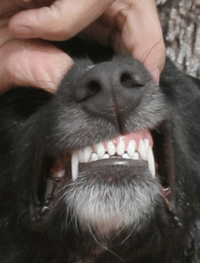 |
Death by Periodontal Disease in Dogs & Cats
Periodontal disease causes damage to the internal organs, which can severely shorten the life of your beloved pet. Cats with poor dental health often develop serious kidney problems as they age. Bacteria from infected gums, releases into the bloodstream and effects the body's organs, including the liver, the kidneys, and the heart. Microscopic lesions have even been found in the brain tissue of animals affected with periodontal disease. Small breeds and short-snouted breeds (or those with a bad bite) are more prone to heart issues and breathing problems, which makes them poor candidates for professional dental cleanings under anesthesia. It is suspected that only a few years of bacteria released from tartar build-up into the bloodstream causes heart damage. This heart damage in tiny breeds, such as Yorkies, results in lesions and heart murmurs that prevent them from ever having any anesthetic procedures. Unfortunately there are NO known statistics being kept on the percentage of anesthetic deaths in veterinary medicine. You, as a responsible pet owner, must weigh the options available on your own. If you're interested in feeding raw treats to help prevent periodontal disease, try feeding your cats raw duck or chicken necks and your dogs raw turkey necks. If you'd like to feed your dogs raw knuckle bones and leg bones, make sure they are large enough that your dogs have to work to get their mouths around them. No rib bones or sharp cuts from the spine. Never leave your dog or cat unsupervised when chewing on things. Chews such as antlers, edible bones, pizzles, and tendons can facilitate tartar and plaque removal, especially in combination with tooth gels and water additives that help soften tartar. Pig ears and rawhides are NOT recommended, especially for small breeds. Large pieces can be easily chewed off and swallowed which can then get lodged in the throat or small intestine, requiring emergency surgery. Pay attention to the size of the chews. If your pet is a known gobbler, take away the pieces that are small enough to swallow but large enough to get lodged. Article by Kat Lacy of Better Life Pet Foods in Las Cruces. |
 |
About Las Cruces | Privacy Policy | Site Usage Agreement | Contact Us | Advertise With Us
© Copyright 2023 MeetLasCruces.com - All Rights Reserved Worldwide.
 Over 70% of all dogs and cats over the age of three have some form of dental disease. Without proper care, by the age of six your pet will likely require Veterinarian intervention to prevent tooth loss and further damage to their overall health.
Over 70% of all dogs and cats over the age of three have some form of dental disease. Without proper care, by the age of six your pet will likely require Veterinarian intervention to prevent tooth loss and further damage to their overall health. 